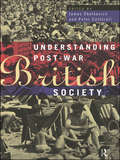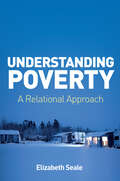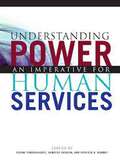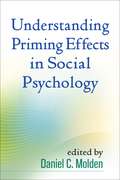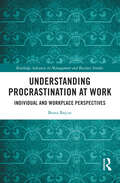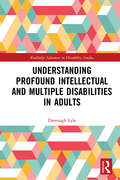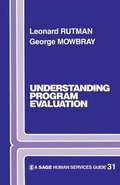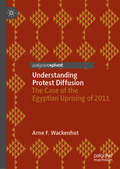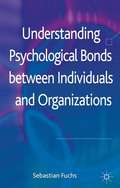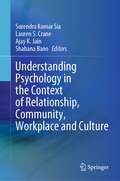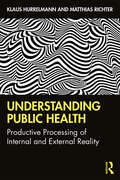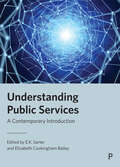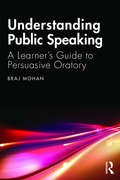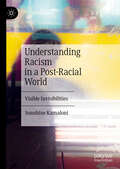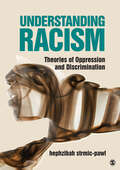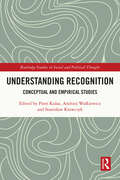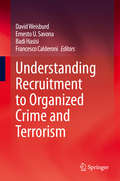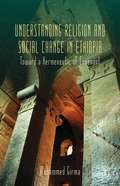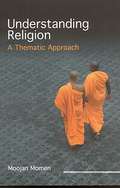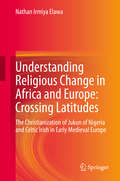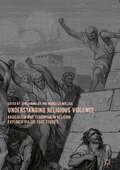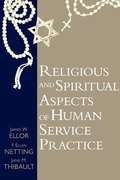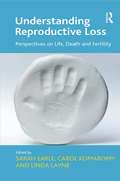- Table View
- List View
Understanding Post-War British Society
by Peter Catterall James ObelkevichToo many sociology textbooks begin and end with how society is structured. To understand how society operates it is necessary to explore not only its constituent structures and relationships, but how these structures emerge and why changes occur within them. By bringing together a group of distinguished sociologists and social historians, this book critically appraises the usefulness of current theories in advancing our understanding of contemporary society. It explores British society as dynamic and developing. In the process the authors draw our attention to the fact that society is shaped not just by social policy and structures, but by how far these influence people's life-patterns, attitudes, experience and conduct. Celia Brackenridge (Cheltenham & Gloucester College of Higher Education, Joan C Brown, Robert G Burgess (University of Warwick), Rosemary Crompton (University of Kent), John Curtice (University of Str
Understanding Poverty: A Relational Approach
by Elizabeth SealePeople in poverty suffer daily under misconceptions about economic hardship and its causes. Providing the most comprehensive consideration to date of poverty in the United States, Elizabeth Seale tackles how we think about issues of culture, behavior, and poverty, cutting straight to the heart of debates about social class. The book addresses tough questions, including how being poor affects individual behavior, and how we can make sense of that in a larger social and political context. The central premise is that to understand the behavior and lives of people in poverty, one must consider their relational context, especially relations of vulnerability and the human need for dignity. Poverty is a social problem we should address as a society by changing social relations that, as a matter of course, cause unnecessary and immense suffering. To do so, we must directly confront our lack of regard for people in poverty by recognizing that they are in fact worthy of an effort to induce major social change. This critical introduction to poverty will be an important read for undergraduate students and above in sociology wanting to learn more about the growing social problems of poverty, inequality, and stratification.
Understanding Power: An Imperative For Human Services
by Elaine PinderhughesUnderstanding Power: An Imperative for Human Services presents basic concepts explaining the multilevel, bidirectional, and recursive operation of power, its effects, and the thinking needed for effective intervention. This resource offers an opportunity to work toward building a metaview from which to address how power operates when it is just and to discover its potential for healing and helping people to find, discover, reclaim, or enhance their own power.
Understanding Priming Effects in Social Psychology
by Daniel C. MoldenHow incidentally activated social representations affect subsequent thoughts and behaviors has long interested social psychologists. Recently, such priming effects have provoked debate and skepticism. Originally a special issue of Social Cognition, this book examines the theoretical challenges researchersmust overcome to further advance priming studiesand considers how these challenges can be met. Thevolume aims to reduce the confusion surrounding current discussions by more thoroughly considering the many phenomena in social psychology that the term "priming" encompasses, and closely examining the psychological processes that explain when and how different types of priming effects occur.
Understanding Procrastination at Work: Individual and Workplace Perspectives (ISSN)
by Beata BajcarUnderstanding Procrastination at Work focuses primarily on procrastination in the workplace, and offers a synthetic and comprehensive review of major theoretical concepts and empirical findings on general procrastination and its specific manifestations, causes, and consequences in the workplace. Building on theoretical insights and empirical research, the monograph proposes and empirically verifies an expanded conceptual framework that integrates individual and work-related factors that contribute to work procrastination and mechanisms explaining this phenomenon. It sits at the intersection of two disciplines, integrating psychological and management knowledge so that a wider audience may benefit from its content. It thus sheds more light on sources and explanatory mechanisms underlying procrastination as a universal behavior in the work setting, with meaningful implications for individuals and organizations alike. Overall, the monograph can serve as a contemporary compendium of knowledge that enables the scientific community and organizational practitioners to better understand procrastination behavior and its implications in professional settings. From the theoretical and empirical perspectives, the monograph provides practical cues to develop prevention and intervention strategies to effectively address and manage procrastination and enhance employee productivity in the organization.
Understanding Profound Intellectual and Multiple Disabilities in Adults (Routledge Advances in Disability Studies)
by Dreenagh LyleThis book explores what happens to people with profound intellectual and multiple disabilities (PIMD) when they reach adulthood. It provides an examination of various terms and definitions in use and a critical exploration of current UK policies. The author brings a wealth of many years’ experience as a family carer, independent consultant and trainer to demonstrate the significant changes that a person-centred, specialised therapeutic and incremental approach can make to an individual’s life. Advances in medical science mean more than ever, people with (PIMD) are growing into adulthood. What is this experience like for an adult who needs support in all aspects of their life? How do we include them in planning support when their intellectual disability means they cannot tell us first hand, what they want or need? Too often this group are overlooked or considered as an afterthought in policy and planning. Notions of independence, employment and mainstream inclusion are all problematic policy ideas for this group of people. Within one-size-fits-all service planning this focus means there is less capacity to meet their life-long specialist, complex and individualised needs. Understanding Profound and Intellectual and Multiple Disabilities in Adults is essential reading for anyone who is involved in the lives of adults with profound intellectual and multiple disabilities, whether as a researcher, student, carer or policy-maker.
Understanding Program Evaluation, Sage Human Services Guides, Volume 31
by Leonard Rutman George Mowbray"This is an interesting monograph and one which should be useful for the intended audience of program managers and students . . . particularly in respect to the emphasis placed on the utilization of evaluation information for management purposes and the need to tailor evaluations to meet this primary purpose." --Canadian Evaluation Society Newsletter
Understanding Protest Diffusion: The Case of the Egyptian Uprising of 2011
by Arne F. WackenhutThis book traces the mobilization process leading up to the January 25 Uprising, and furthers our understanding of the largely unexpected diffusion of protest during this Egyptian Revolution. Focusing on the role of the so-called “Cairo-based political opposition,” this study strongly suggests a need to pay closer attention to the complexity and contingent nature of such large-scale protest episodes. Building on interviews with activists, employees of NGOs in the human rights advocacy sector, and journalists, this in-depth single case study reveals how different movement organizations in the Egyptian prodemocracy movement had long, and largely unsuccessfully, tried to mobilize support for socio-political change in the country. Against this backdrop, the book illustrates how a coalition of activists sought to organize a protest event against police brutality in early 2011. The resulting protests on January 25 surprised not only the regime of Hosni Mubarak, but also the organizers.
Understanding Psychological Bonds between Individuals and Organizations
by Sebastian FuchsOrganizations operating in competitive environments habitually seek ever-new avenues to increase and optimize the performance of their individual employees. One popular device to increase employees' performance, especially those elements of performance that are left to the discretion of an individual, refers to the idea of creating a strong, meaningful psychological bond between an individual and an organization. Understanding Psychological Bonds between Individuals and Organizations looks at precisely this device and proposes a novel, integrated and comprehensive model which investigates the different mechanisms that help to explain such psychological bonds.
Understanding Psychology in the Context of Relationship, Community, Workplace and Culture
by Surendra Kumar Sia Lauren S. Crane Ajay K. Jain Shabana BanoThis book explores the significant deliverables of psychology to society in five sections: identity and relationship, psychology for gainful employment, psychology customized to the community, culturally embedded psychology and alternatives for maximizing psychology. The authors, social scientists of diverse nationalities, represent novel psychological methods, tools and procedures that can have immense social utility in strengthening the relationship and rejuvenating the community. The first section offers an in-depth perspective on the dynamics between identity and relationship. The second section encompasses psychology's contribution in addressing community-based issues like farmer suicide, cyberbullying, smartphone overuse, substance abuse and collective environmental behaviour. The authors in the third section have deliberated upon the behavioural issues pertinent for gainful employment. The fourth section delineates the influence of culture on specific psychological processes. The last section touches upon means beyond conventional strategies, techniques and approaches that may augment psychology's deliverability. The chapters in this book are based upon evidence-based scholarships from seven different countries. As such, it represents an invaluable resource for research scholars and academicians in psychology, human resource managers and mental health practitioners.
Understanding Public Health: Productive Processing of Internal and External Reality
by Matthias Richter Klaus HurrelmannThis book develops a new model of the genesis of health, on the basis of the interplay between genetic and environmental factors. Hurrelmann and Richter build upon the basic theories of health and the popular model of salutogenesis to offer a comprehensive interdisciplinary theory of health genesis and success: Productive Processing of Reality (PPR). The authors show that health is the lifelong dynamic process of dealing with the internal reality of physical and psychological impulses and the external reality of social and material impulses. To demonstrate this, the book is split into three interconnected parts. Part A analyses the determinants of health, providing an overview of the insights of current research and the impact of socioeconomic influences and gender on health. Part B covers public health, social, learning and coping theories, all of which understand health as an interaction between people and their environment. Part C draws on these four theories to outline PPR, stressing the interrelation between physical and mental constitution and the demands of the social and mental environment, and suggesting strategies for coping with these demands during the life course. Understanding Public Health: Productive Processing of Internal and External Reality will be valuable reading for students and researchers in psychology, sociology, educational science, public health and medical science, and for policymakers in public health.
Understanding Public Services: A Contemporary Introduction
by E.K. Sarter and Elizabeth Cookingham BaileyDive inside this textbook for an accessible guide to the discipline of public services. Perfect for students, it offers a comprehensive account of core public service topics and explains the fundamental elements of working in the public services. Outlining their role in the welfare state, it explores the policies, providers and legalities shaping the context in which public services operate. Students will study concepts of organisational change, strategy, management, leadership and funding, and engage with timely discussions around contemporary public issues such as equality, sustainability and climate change. Key features to support student learning include: • objectives at the beginning of each chapter; • case studies and examples; • end of chapter summaries; • reflective questions; • further reading recommendations and resources. Bringing together authors with expertise in politics and public policy, social policy and law, this book is essential reading for everybody studying public services.
Understanding Public Speaking: A Learner's Guide to Persuasive Oratory
by Braj MohanPublic speaking is a much coveted yet difficult art. This book illustrates the use of various linguistic devices and persuasive strategies with examples from the speeches of powerful orators in history. It systematically draws on the various approaches to public speaking and persuasive discourse to present new insights and techniques. The volume: Critically examines strategies of persuasive oratory. Draws on extensive investigation of a corpus of famous public speeches in history. Focuses on the needs of those who want to brush up their public speaking skills. The volume will be a key reference for aspiring civil servants, lawyers, business and corporate professionals, and politicians. It will be of great interest to scholars of linguistics, and political and business communication.
Understanding Racism in a Post-Racial World: Visible Invisibilities
by Sunshine KamaloniThis book addresses the question: how can we talk about race in a world that is considered post-racial, a world where race doesn’t exist? Kamaloni engages with the tradition of everyday racism and traces the process of racialisation through the interaction of bodies in space. Exploring the embodied experience exposes the idea of post-racialism as a response to continued cultural anxieties about race and the desire to erase it. Understanding Racism in a Post-Racial World presents a broader question about what everyday encounters about race might tell us about the current cultural construction of race. The book provides a much-needed investigation of the intersection of race, bodies and space as a critical part of how bodies and spaces become racialised, and will be of value to students and scholars interested in understanding and discussing race across interdisciplinary areas such as cultural studies, communication, gender studies, geography, body studies, literature studies and urban studies.
Understanding Racism: Theories of Oppression and Discrimination
by Hephzibah Strmic-PawlRecipient of a 2022 Most Promising New Textbook Award from the Textbook & Academic Authors Association (TAA) The author is a proud sponsor of the 2020 SAGE Keith Roberts Teaching Innovations Award—enabling graduate students and early career faculty to attend the annual ASA pre-conference teaching and learning workshop. Understanding Racism systematically examines the theories and theorists that have contributed the most to our contemporary understanding of racism in its various forms—making it easier for students to understand the multiple dynamics of how racism operates. In every chapter, activist and award-winning sociologist Hephzibah Strmic-Pawl describes the emergence of a theory and the problem it addresses; discusses the scholars who are most closely associated with the theory; and explores the strengths and limitations of the theory. From foundational theories such as Prejudice and White Privilege to contemporary theories such as Color-Blind Racism, Understanding Racism is the first text to present thirteen approaches for explaining racism in one book. The book′s systematic organization and pedagogical features will help students think theoretically about race and racism at different levels of analysis, as well as reflect and discuss how to challenge racism.
Understanding Racism: Theories of Oppression and Discrimination
by Hephzibah Strmic-PawlRecipient of a 2022 Most Promising New Textbook Award from the Textbook & Academic Authors Association (TAA) The author is a proud sponsor of the 2020 SAGE Keith Roberts Teaching Innovations Award—enabling graduate students and early career faculty to attend the annual ASA pre-conference teaching and learning workshop. Understanding Racism systematically examines the theories and theorists that have contributed the most to our contemporary understanding of racism in its various forms—making it easier for students to understand the multiple dynamics of how racism operates. In every chapter, activist and award-winning sociologist Hephzibah Strmic-Pawl describes the emergence of a theory and the problem it addresses; discusses the scholars who are most closely associated with the theory; and explores the strengths and limitations of the theory. From foundational theories such as Prejudice and White Privilege to contemporary theories such as Color-Blind Racism, Understanding Racism is the first text to present thirteen approaches for explaining racism in one book. The book′s systematic organization and pedagogical features will help students think theoretically about race and racism at different levels of analysis, as well as reflect and discuss how to challenge racism.
Understanding Recognition: Conceptual and Empirical Studies (Routledge Studies in Social and Political Thought)
by Piotr KulasAs the concept of recognition shifts from philosophical theory to other fields of the humanities and social sciences, this volume explores the nature of this border category that exists in the space between sociological and philosophical considerations, related as it is to concepts such as status, prestige, the looking-glass self, respect, and dignity - at times being used interchangeably with these terms. Bringing together work from across academic disciplines, it presents theoretical conceptualizations of recognition, demonstrates its operationalization in historical and literary research, considers recognition as a fundamental problem of sociological theory and examines the concept as a marker of social distances and redistribution. An examination and demonstration of the full potential of recognition as a category, Understanding Recognition: Conceptual and Empirical Studies explores the contemporary meanings and manifestations of recognition and sheds light on its capacity to complement the notions of status, class or prestige. As such, it will appeal to scholars of sociology and social theory, philosophy, history and literary studies.
Understanding Recruitment to Organized Crime and Terrorism
by David Weisburd Francesco Calderoni Badi Hasisi Ernesto U. SavonaThis volume provides insights on how recruitment patterns develop for two related types of criminal networks: organized crime and terrorism. It specifically explores the social, situational, psychological, and economic drivers of recruitment. Although organized crime networks and terrorism networks can differ in underlying goals and motivations, this volume demonstrates common drivers in their recruitment, which will provide insights for crime prevention and intervention. The goal of the book is to explore the current knowledge about these common drivers, as well as highlight emerging research, to identify and prioritize a research agenda for scholars, as well as policymakers. The research presented in this work aims to fill existing gaps in the knowledge of recruitment to both organized crime and terrorism. For each area, it provides a systematic review of the existing research on social, psychological, and economic drivers of recruitment. It then presents findings from independent original research aimed to explore new ground not covered in these previous studies. The contributions to this volume were the result of a research project funded by a European Union Horizon 2020 grant, and present a diverse, international mix of expertise and cases. It will be of interest to researchers in criminology and criminal justice, as well as related fields such as sociology, psychology, and international relations. Chapter 13 of this book is available open access under a CC BY 4.0 license.
Understanding Religion and Social Change in Ethiopia
by Mohammed GirmaReligiosity is one aspect without which Ethiopian society cannot be fully understood. This book aims to map out the terrain of the discourse in religion-social change nexus in Ethiopian using the notion of covenant as an interpretive tool.
Understanding Religion: A Thematic Approach
by Moojan MomenWith the aid of hundreds of photographs, an in-depth exploration of the role of religionAn innovative, thematic presentation of the role of religion in human society, from traditional cultures to the modern world, this comprehensive account will prove invaluable for students, experts or the interested general readers seeking an understanding of the nature and significance of diverse religious experience. Drawing from all major religious traditions in the world, as well as a variety of non-religious disciplines such as psychology, philosophy and sociology, Momen's informative study covers everything from art and history to theology and the World Wide Web.
Understanding Religious Change in Africa and Europe: The Christianization of Jukun of Nigeria and Celtic Irish in Early Medieval Europe
by Nathan Irmiya ElawaThis book examines and compares the religious experience of an African group with a European one. It offers an ethnographical investigation of the Jukun of north central Nigeria. The author also organically weaves into the narrative the Christianization of the Irish in a comparative fashion. Throughout, he makes the case for an African Christianity connected to a Celtic Irish Christianity and vice-versa -- as different threads in a tapestry. This work is a product of a synthesis of archival research in three continents, interviews with surviving first-generation Christians who were active practitioners of the Jukun indigenous religion, and with former missionaries to the Jukun. On the Irish side, it draws from extant primary sources and interviews with scholars in Celtic Irish studies. In addition, pictures, diagrams, and excerpts from British colonial and missionary journals provide a rich contextual understanding of Jukun religious life and practices. The author is among the emerging voices in the study of World Christianity who advocate for the reality of "poly-centres" for Christianity. This perspective recognizes voices from the Global South in the expansion of Christianity. This book serves as a valuable resource for historians, anthropologists, theologians, and those interested in missions studies, both scholars and lay readers seeking to deepen their understanding of World Christianity.
Understanding Religious Ritual: Theoretical approaches and innovations (Routledge Advances in Sociology)
by Gadi WolfsfeldAlthough numerous studies of religious rituals have been conducted by religious studies scholars, anthropologists, sociologists, and psychologists, it is rare to find a work that brings scholars from different disciplines together to discuss the similarities and differences in their research. This book represents contributions by leading scholars from several disciplines that show the diversity of approaches to religious rituals, while also providing cross-disciplinary perspectives on this topic. The goals of the chapters are to consider where the field currently stands in understanding religious rituals and what novel ideas can improve our knowledge about these practices; and furnish innovative applications of theory by discussing particular examples which are drawn from the authors’ fieldwork. The chapters cover Christian, Buddhist, Jewish, and Islamic rituals, thus providing a view of how ritual practices vary across the globe, but also how they share some important characteristics.
Understanding Religious Violence: Radicalism and Terrorism in Religion Explored via Six Case Studies
by James Dingley Marcello MollicaThis book addresses the problem of religiously based conflict and violence via six case studies. It stresses particularly the structural and relational aspects of religion as providing a sense of order and a networked structure that enables people to pursue quite prosaic and earthly concerns. The book examines how such concerns link material and spiritual salvation into a holy alliance. As such, whilst the religions concerned may be different, they address the same problems and provide similar explanations for meaning, success, and failure in life. Each author has conducted their own field-work in the religiously based conflict regions they discuss, and together the collection offers perspectives from a variety of different national backgrounds and disciplines.
Understanding Religious and Spiritual Aspects of Human Service Practice
by F. Ellen Netting James Ellor Jane M. ThibaultContending that despite current efforts to make social workers sensitive to differences of race, ethnicity, and gender, the diversity and impact of religious beliefs has often been overlooked, three professors of social work/human services offer a guide to direct practice concerns. Spiritual assessment, positive and pathological uses of religious practice, and the need for spiritual self-awareness among human-service workers are explored, as are issues related to community, congregation, and making of public policy. Annotation c. Book News, Inc., Portland, OR (booknews.com)
Understanding Reproductive Loss: Perspectives on Life, Death and Fertility
by Carol KomaromyThe study of human reproduction has focused on reproductive ’success’ and on the struggle to achieve this, rather than on the much more common experience of ’failure’, or reproductive loss. Drawing on the latest research from The UK and Europe, The United States, Australia and Africa, this volume examines the experience of reproductive loss in its widest sense to include termination of pregnancy, miscarriage, stillbirth, perinatal and infant death, as well as - more broadly - the loss of desired normative experiences such as that associated with infertility, assisted reproduction and the medicalisation of 'high risk' pregnancy and birth. Exploring the commonalities, as well as issues of difference and diversity, Understanding Reproductive Loss presents international work from a variety of multi-disciplinary perspectives and will appeal to sociologists, anthropologists and other social scientists with interests in medicine, health, the body, death studies and gender.
